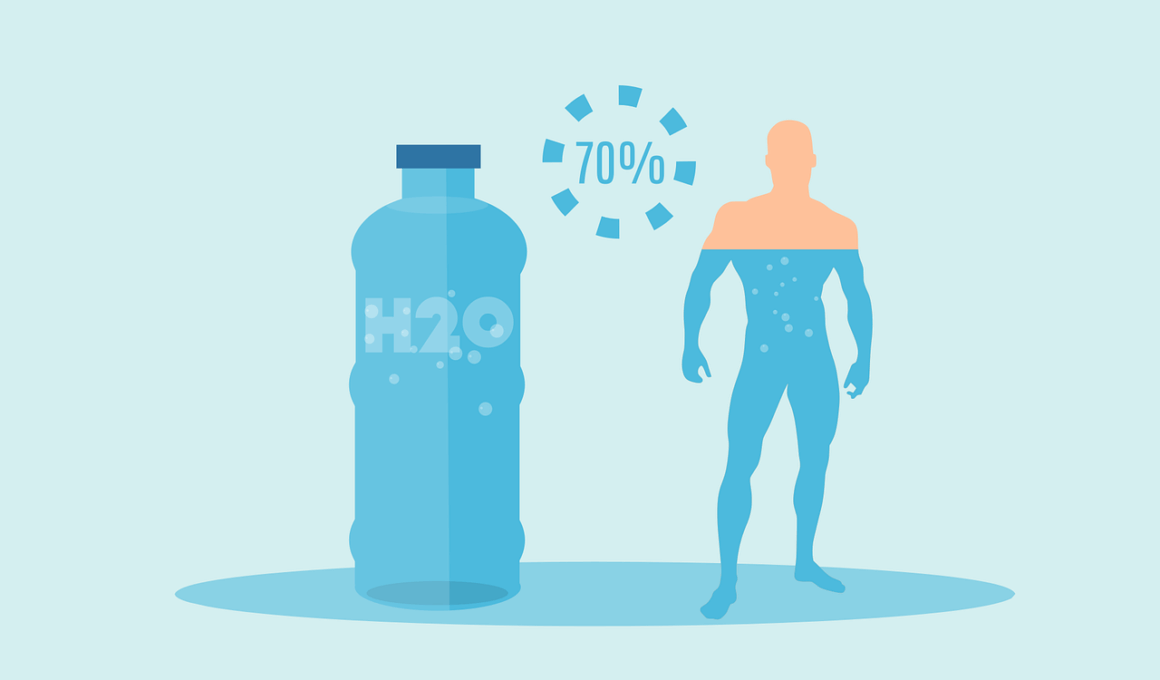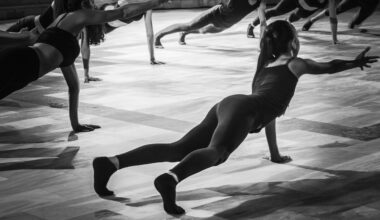The Role of Hydration in Enhancing Recovery
Hydration plays a crucial role in recovery from intense workouts, helping to restore the body’s equilibrium after strenuous exercise. When we exercise, we lose fluids through sweat, which can lead to dehydration if not replenished. Dehydration can affect physical performance, cognitive function, and recovery time, making it imperative for individuals to prioritize their fluid intake. Proper hydration aids in various physiological functions, such as temperature regulation, nutrient transportation, and muscle recovery. Additionally, it helps to reduce soreness and stiffness that can occur post-exercise, making recovery smoother. Incorporating hydration into your recovery routine will not only enhance performance but also prolong endurance. Water is the most accessible source for hydration; however, sports drinks offer electrolytes that are beneficial after intense workouts. Monitoring your fluid intake should become as routine as scheduled training. Using strategies such as drinking before, during, and after workouts can enhance recovery. Also, tracking your hydration levels can aid in achieving optimal performance. Establishing personalized hydration plans tailored to individual needs can optimize recovery effectively.
Effective hydration encompasses more than just drinking water; it involves understanding the specific needs of your body post-exercise. Different workout types, intensities, and durations create varied hydration demands. For instance, after heavy workouts or extensive cardiovascular training, maintaining electrolyte balance becomes critical. This ensures that the muscles and nervous system function optimally during recovery. Recommended hydration strategies vary according to the individual and their training routine. A general guideline suggests consuming at least 500mL of fluid within two hours after exercising. This helps to rehydrate the body rapidly and significantly improves recovery rates. Furthermore, monitoring the color of urine can help you gauge hydration levels; pale yellow indicates adequate hydration, while dark yellow suggests a lack of fluids. A hydration schedule tailored to personal needs, taking into account body weight, sweat rates, and exercise intensity is essential for maximizing recovery. Incorporating hydrating foods like fruits and vegetables can also enhance overall fluid intake. Being mindful of hydration will speed up recovery times, support performance during subsequent workouts, and promote overall well-being.
Hydration and Muscle Recovery
Muscle recovery is enhanced through proper hydration, which facilitates various biochemical processes necessary for muscle repair and regeneration. Water acts as a transport medium for vital nutrients that need to reach muscle tissues after strenuous exercise. Proper fluid intake post-workout allows the body to efficiently clear metabolic waste, reducing soreness and fatigue, and supporting faster recovery. Furthermore, electrolytes play a critical role in muscle function; a deficiency in minerals such as sodium, potassium, and magnesium can lead to cramps and prolonged recovery times. Therefore, drinking water alone may not always be sufficient; artificially flavored sports drinks can effectively replenish lost electrolytes during intense workouts. Additionally, factors like body weight, intensity, and duration of workouts dictate your hydration needs. A sound hydration strategy includes drinking fluids before, during, and after exercise to achieve optimal results. This proactive approach helps with muscle recovery, increasing the availability of energy stores for subsequent workouts. Ultimately, understanding your body’s hydration needs will greatly influence muscle recovery and overall performance outcomes.
The Impact of Hydration on Performance
Understanding the impact of hydration on performance is essential for both amateur and professional fitness enthusiasts. Dehydration can negatively affect physical and mental performance, leading to suboptimal results during training sessions or competitions. Even mild dehydration can impair endurance, strength, and cognitive functions, which highlights hydration’s pivotal role. Optimizing hydration before, during, and after exercise can significantly improve athletic performance. For instance, hydration helps maintain peak blood volume, enabling the heart to pump oxygen-rich blood more efficiently to working muscles. This, in turn, helps sustain endurance throughout workouts. Furthermore, proper hydration helps to delay fatigue, thus allowing individuals to push themselves harder and longer. Maintaining electrolyte balance, especially in hot weather, becomes crucial due to increased sweat loss. It’s important to note that drinking sports drinks or electrolyte-rich fluids can be advantageous for those who exercise for more than an hour, both for hydration and fueling energy. Each individual should experiment with their hydration strategies to find what best supports their performance.
Strategies for Successful Hydration
Implementing effective hydration strategies requires attention to the details of your training regime and environmental conditions. One reliable strategy is to establish a drinking schedule that incorporates fluid intake before, during, and after your workouts. Aim to consume roughly 500mL of water about two hours prior to your exercise session. During intense workouts, consider sipping on electrolytes to replenish essential minerals lost through perspiration. This not only rehydrates but also sustains energy levels, making it easier to maintain your performance throughout the workout. After finishing your exercise, it’s crucial to replace lost fluids and electrolytes swiftly. A common recommendation is to drink water in varied increments throughout the day, rather than waiting until you feel thirsty; this can enhance your recovery process. Additionally, incorporating hydrating food options such as watermelon, cucumbers, and oranges can indirectly contribute to overall fluid intake. Paying attention to factors like altitude, humidity, and exercise duration will allow you to adjust your hydration needs effectively. Overall, these personalized hydration strategies will optimize recovery and improve performance.
While the importance of hydration cannot be overstated, many athletes overlook symptoms of dehydration. Awareness of these signs is essential to ensure optimal recovery. Common signals include intense thirst, dry mouth, fatigue, and dark urine. Ignoring these signs can prolong recovery periods and even increase the risk of injury. Adequate hydration should not be the responsibility of athletes alone; coaches and trainers must also foster a culture that prioritizes hydration techniques. Constant reminders and access to water stations will promote consistent fluid intake during training sessions or events. Another effective approach is integrating hydration into workout planning, ensuring athletes have designated breaks for rehydration. After intense workouts, recovery drinks containing electrolytes can also speed up replenishment. Establishing a habit of regular hydration can create lasting change. That habit, combined with an understanding of hydration’s benefits, can influence an athlete’s performance dramatically. Overall, maintaining proper fluid levels mitigates the negative effects of dehydration, enhances recovery processes, fortifies overall well-being, and promotes optimal athletic capabilities.
As hydration awareness spreads, innovative hydration products and techniques emerge to support recovery. The market offers a range of electrolyte drinks, tablets, and even hydration packs that athletes can utilize during their training sessions. It is crucial, however, to choose the most suitable hydration products for your body and workout circumstances. Consider factors such as taste preference and digestive comfort, which can significantly impact fluid consumption. Any product choice should be part of a broader hydration plan, which takes personal needs, exercise intensity, and duration into account. By continuously evaluating and experimenting with various hydration products, an athlete can maintain optimal performance and recovery. Furthermore, the role of technology should not be overlooked; hydration-tracking apps can assist individuals in meeting their daily fluid intake goals. Alternatives like wearable devices monitor sweat loss and electrolyte depletion, offering personalized hydration solutions. Commitment to this process will enhance performance while fostering a more profound understanding of hydration’s critical role in recovery, ensuring longevity in athletic pursuits.
Conclusion: Prioritizing Hydration for Overall Health
In conclusion, prioritizing hydration is fundamental to enhancing recovery and overall fitness performance. Athletes and fitness enthusiasts alike must develop a consistent hydration routine that encompasses not only water intake but also electrolyte replenishment. Understanding the role of fluids in muscle recovery, fatigue management, and maintaining performance should guide hydration strategies. Whether through regular monitoring of hydration levels or incorporating hydration-rich foods, the emphasis should be on achieving balance. With various products and strategies available, finding what works best for each individual becomes essential. Moreover, education on hydration should be a continuous process, helping to debunk myths that may hinder optimal recovery. As we embrace various hydration techniques, we simultaneously empower ourselves to achieve higher levels of performance and recovery efficiency. The relationship between hydration and recovery provides insights into how crucial fluid management is in a fitness journey. As such, committing to this practice promises not only improved athletic performance but the well-being that comes with an adequately hydrated body.


